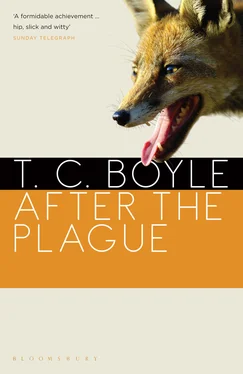The girl’s name was Marlene, but she didn’t pronounce it like the old German actress who was probably dead before she was born, but Mar- lenna, the second syllable banged out till it sounded as if she was calling herself Lenny. I liked the way her smile showed off the gold caps on her molars. The band I didn’t want to mention earlier was playing through the big speakers over the bar, and there was a whole undercurrent of noise and excitement mixed with the smells of tap beer, Polish sausage and salt-and-vinegar chips. “I know you,” she said. “You’re, um, Tom McNeil’s son, right?”
I never looked away from her, never blinked. All that was old news now, dead and buried, like some battle in the Civil War.
“That’s right,” I said. “How did you guess?”
He didn’t know much about Mexico, not really, if you discount the odd margarita and a determined crawl through the pages of Under the Volcano in an alcoholic haze twenty years ago, but here he was, emerging pale and heavy from the sleek envelope of the airliner and into the fecund embrace of Puerto Escondido. All this — the scorching blacktop, the distant arc of the beach, the heat, the scent of the flowers and the jet fuel, and the faint lingering memory of yesterday’s fish — was an accident. A happy accident. A charity thing at work — give five bucks to benefit the Battered Women’s Shelter and win a free trip for two to the jewel of Oaxaca. Well, he’d won. And to save face and forestall questions he’d told everybody he was bringing his girlfriend along, for two weeks of R. and R. — Romance and Relaxation. He even invented a name for her — Yolanda — and yes, she was Mexican on her mother’s side, gray eyes from her father, skin like burnished copper, and was she ever something in bed….
There were no formalities at the airport — they’d taken care of all that in Mexico City with a series of impatient gestures and incomprehensible commands — and he went through the heavy glass doors with his carry-on bag and ducked into the first cab he saw. The driver greeted him in English, swivelling round to wipe an imaginary speck of dust from the seat with a faded pink handkerchief. He gave a little speech Lester couldn’t follow, tossing each word up in the air as if it were a tight-stitched ball that had to be driven high over the fence, then shrank back into himself and said, “Where to?” in a diminished voice. Lester gave the name of his hotel — the best one in town — and sat back to let the ripe breeze wash over his face.
He was sweating. Sweating because he was in some steaming thick tropical place and because he was overweight, grossly overweight, carrying fifty pounds too many and all of it concentrated in his gut. He was going to do something about that when he got back to San Francisco — join a club, start jogging, whatever — but right now he was just a big sweating overweight man with bare pale legs set like stanchions on the floor of the cab and a belly that soaked right through the front of his cotton-rayon open-necked shirt with the blue and yellow parrots cavorting all over it. And there was the beach, scalloped and white, chasing along beside the car, with palm trees and a hint of maritime cool, and before ten minutes had ticked off his watch he was at the hotel, paying the driver from a wad of worn velvety bills that didn’t seem quite real. The driver had no problem with them — the bills, that is — and he accepted a fat velvety tip too, and seven and a half minutes after that Lester was sitting in the middle of a shady tiled dining room open to the sea on one side and the pool on the other, a room key in his pocket and his first Mexican cocktail clenched in his sweaty fist.
He’d negotiated the cocktail with the faintest glimmer of half-remembered high-school Spanish — jooze naranja, soda cloob and vodka, tall, with ice, hielo, yes, hielo —and a whole repertoire of mimicry he didn’t know he possessed. What he’d really wanted was a Greyhound, but he didn’t know the Spanish word for grapefruit, so he’d fallen back on the orange juice and vodka, though there’d been some confusion over the meaning of the venerable Russian term for clear distilled spirits until he hit on the inspiration of naming the brand, Smirnoff. The waitress, grinning and nodding while holding herself perfectly erect in her starched white peasant dress, repeated the brand name in a creaking singsong voice and went off to fetch his drink. Of course, by the time she set it down, he’d already drunk the better half of it and he immediately ordered another and then another, until for the first twenty minutes or so he had the waitress and bartender working in perfect synchronization to combat his thirst and any real or imagined pangs he might have suffered on the long trip down.
After the fifth drink he began to feel settled, any anxiety over travelling dissolved in the sweet flow of alcohol and juice. He was pleased with himself. Here he was, in a foreign country, ordering cocktails like a native and contemplating a bite to eat — guacamole and nachos, maybe — and then a stroll on the beach and a nap before dinner. He wasn’t sweating anymore. The waitress was his favorite person in the world, and the bartender came next.
He’d just drained his glass and turned to flag down the waitress — one more, he was thinking, and then maybe the nachos — when he noticed that the table at the far end of the veranda was occupied. A woman had slipped in while he was gazing out to sea, and she was seated facing him, bare-legged, in a rust-colored bikini and a loose black robe. She looked to be about thirty, slim, muscular, with a high tight chest and feathered hair that showed off her bloodshot eyes and the puffed bow of her mouth. There was a plate of something steaming at her elbow — fish, it looked like, the specialty of the house, breaded, grilled, stuffed, baked, fried, or sautéed with peppers, onion, and cilantro — and she was drinking a Margarita rocks. He watched in fascination — semi-drunken fascination — for a minute, until she looked up, chewing, and he turned away to stare out over the water as if he were just taking in the sights like any other calm and dignified tourist.
He was momentarily flustered when the waitress appeared to ask if he wanted another drink, but he let the alcohol sing in his veins and said, “Why not?”— “¿Por qué no?” —and the waitress giggled and walked off with her increasingly admirable rump moving at the center of that long white gown. When he stole another glance at the woman in the corner, she was still looking his way. He smiled. She smiled back. He turned away again and bided his time, but when his drink came he tossed some money on the table, rose massively from the chair, and tottered across the room.
“Hi,” he said, looming over the chewing woman, the drink rigid in his hand, his teeth clenched round a defrosted smile. “I mean, Buenos tardes. Or noches. ”
He watched her face for a reaction, but she just stared at him.
“Uh, ¿Cómo está Usted? Or tú. ¿Cómo estás tú? ”
“Sit down, why don’t you,” she said in a voice that was as American as Hillary Clinton’s. “Take a load off.”
Suddenly he felt dizzy. The drink in his hand had somehow concentrated itself till it was as dense as a meteorite. He pulled out a chair and sat heavily. “I thought … I thought you were—?”
“I’m Italian,” she said. “From Buffalo, originally. All four of my grandparents came from Tuscany. That’s where I get my exotic Latin looks.” She let out a short bark of a laugh, forked up a slab of fish, and began chewing vigorously, all the while studying him out of eyes that were like scalpels.
Читать дальше












